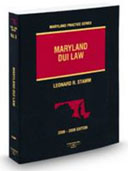In Maryland, if the defendant pleads guilty or is found guilty after a trial, sentencing usually takes place immediately. The judge has already heard the facts of the case. At this point the judge wants to hear something about the defendant, including but not limited to: age; educational background; family situation; employment; and most importantly, whether the defendant has been assessed by a state certified alcohol counselor to determine whether the defendant has a drinking problem and has begun or completed the recommended program.
The assessment is made using standard screening tests, including the Michigan Alcohol Screening Test, also known as the “MAST” test, and others. On a first offense, offenders assessed as a “social drinker” are normally recommended to complete a 12-hour class. This is usually spread out over six weeks, with six two-hour evening sessions. Offenders assessed as a problem drinker are usually recommended to complete a 26 week program.
If the defendant thinks it is unlikely he or she will want to take an appeal from the guilty finding and is requesting probation before judgment, also known as “PBJ,” then the defendant should probably make a short statement of remorse, and indicate the steps being taken to ensure that something like this will never happen again.
A typical sentence on a first offense in Maryland is probation before judgment or PBJ which means the defendant does not receive a conviction. However, a record is kept on this offense with the Motor Vehicle Administration (MVA) forever, so that the State will know about the offense if in the future the person receives a new DUI charge. The arrest, charges, and guilty finding can never be expunged from court records or MVA records. However, insurance companies cannot access PBJ records at the MVA.
Usually the judge also imposes a fine, requires the defendant to attend a MADD victim impact panel (a two-hour meeting where the defendant hears the stories of drunk driving victims), places the defendant on supervised or unsupervised probation for from six to 18 months, with the average being one year, subject to the conditions specified by the court. These can include restrictions on travel, obtaining an alcohol or ignition interlock restriction on the driver’s license, abstinence from alcohol, and completing any alcohol education or treatment class.
It is important to note, that in many cases, and with most judges, on a first offense, if there are no aggravating factors such as an accident with injuries or an extremely high test result, you don’t necessarily even need a lawyer to get these results if you have taken an alcohol education class. That is why I feel strongly that a lawyer should strive to achieve a better result for the client. That means coming to court prepared to plead not guilty and go to trial if the State does not drop the alcohol charge. On most first offenses I view a PBJ as a loss. While a PBJ has advantages such as not being considered a conviction and not available to insurance companies, the disadvantage is that unlike almost every other crime on the books, court, police, and MVA records of a PBJ for a DUI or DWI can never be expunged.
If you are facing serious traffic charges in Maryland call Leonard R. Stamm or Johanna Leshner of Goldstein & Stamm, P.A. at 301-345-0122 for a free consultation.
Leonard R. Stamm Goldstein & Stamm, P.A.
6301 Ivy Lane, Suite 504 Greenbelt, Maryland 20770 www.lstamm.com
301-345-0122 (fax) 301-441-4652
Author: West’s Maryland DUI Law

